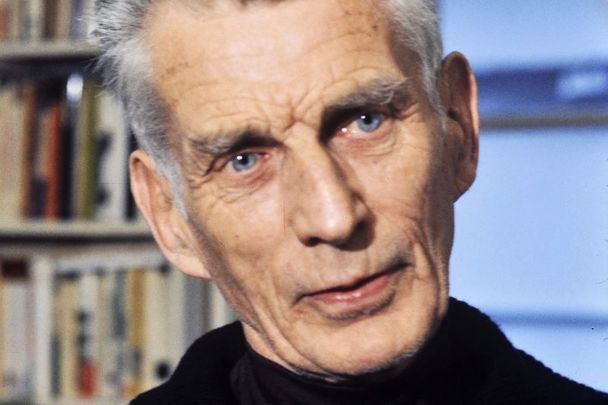Samuel Becket
Irish novelist and playwright Samuel Becket, best known for his play, Waiting for Godot (1952) won the Nobel Prize for Literature in 1969. A leading figure in the Theatre of the Absurd, and a major influence on British play - wrights such as Harold Pinter and Tom Stoppard, he showed characters struggling to survive in an empty and meaningless universe. His world view was uncompromisingly bleak, but he drew extensively on the forms and styles of comedy, both the verbal comedy and the visual comedy of silent movie comedians such as Buster Keaton and Charlie Chaplin.
As a poet Beckett made his debut in 1930 with ‘Whoroscope: a poem on the French philosopher René Descartes’, a 98-line poem accompanied by 17 footnotes. In this dramatic monologue, the protagonist, Rene Descartes, waits for his morning omelette while meditating on obscure theological mysteries, the passage of time, and the approach of death. A critical work, ‘Proust’, was published in 1931, followed by ‘More Pricks Than Kicks’, a series of connected stories set in Dublin, in 1934. Beckett's career as a novelist began in 1938 with ‘Murphy’, which depicted the protagonist’s inner struggle between his desire for his prostitute-mistress and his wish to escape from suffering by withdrawing into a purely mental existence, The conflict is resolved when he is atomised by a gas explosion. Beckett worked as a farm labourer and wrote ‘Watt’ (1953) which was the last of his novels written originally in English.
After the war Beckett worked briefly with the Irish Red Cross in Paris. Between 1946 and 1949 he produced the major prose narrative trilogy, Molloy, Malone Meurt and L’Innomable, (Molloy, Malone Dies, The Unnameable) which appeared in the early 1950s. The novels were Written in French and subsequently translated into English with substantial changes. These books reflected Beckett's bitter realisation that there is no escape from illusion, or from the Cartesian compulsion to think and try to solve insoluble problems.
En Attendant Godot (Waiting for Godot) Was first performed in Paris in 1953, and quickly earned Beckett world-wide fame. The play, one of the most influential dramatic works of the twentieth century, is a tragic farce presenting an existentialist vision of the meaninglessness of human existence. Vladimir and Estragon, who call each other Didi and Gogo, meet near a bare tree on a country road to await the arrival of Godot. To pass the time they try to recall their past, tell jokes, and speculate about Godot. PoZzo, a bourgeois tyrant, and Lucky, his servant, appear briefly. A boy brings word that Godot will not come that day but will surely come the next. In Act II they are still waiting, and Godot sends another message. At the end of each Act they consider hanging themselves, then declare their intention to leave, but have no energy to move. The nihilistic message is delivered in clipped dialogue which is sometimes poetic, but more often comic, being reminiscent of music-hall comedy. The play's debt to comedy, even farce, is exemplified in the closing scene where Estragon's trousers fall down when, searching for a means of hanging himself, he removes the cord he has been using as a belt.
After Waiting for Godot Beckett wrote ‘Endgame’ (1957) and a series of stage plays and brief pieces tor the radio. Endgame developed further one of Beckett's central themes, men in mutual dependence. Hamm and Clov occupy a room with Nagg and Nell, Hamm's parents, who live in dustbins. The blind and tyrannical Hamm, apparently unable to move from his armchair, is dependent on his servant Clov, who although determined to leave and become independent of Hamm, ever actually does so. One possible approach to this play is to see the two characters as aspects of one man's mind, and to see the set, with two windows in a bare wall, as the inside of a skull.
In ‘Krapp's Last Tape’ (1959) Beckett returned to his native language. The play depicts a disgruntled old man sitting alone in his room. At night he listens to tape recordings from various periods of his past.
Just as Beckett's prose style became increasingly economical and unadorned, so did his plays. ‘Happy Days’ (1961) is almost a monologue, delivered by the protagonist Winnie as she is progressively buried until only her head is visible. The striking image was taken a stage further in ‘Not I’ (1973) in which only a speaking mouth is visible. Beckett also explored the possibilities of the medium of radio.
Beckett continued his practice of presenting his nihilistic message through bizarrely humorous symbolic images in his last full length novel, ‘Comment C'est’ (How It Is) (1961). The protagonist crawls across the mud dragging a sack of canned food behind him. He Overtakes another crawler whom he tortures into speech, then is left alone waiting to be overtaken himself by another crawler who will torture him in turn.
Beckett continued writing until his death, producing works for radio and television, as well as plays, such as Catastrophe (1984) which was written for the Czech playwright, poet, and political dissident, Vaclav Havel.

Iam glad that I found you to have a clear,
ReplyDeleteconcept of literature....
Wow sir thank you
ReplyDelete